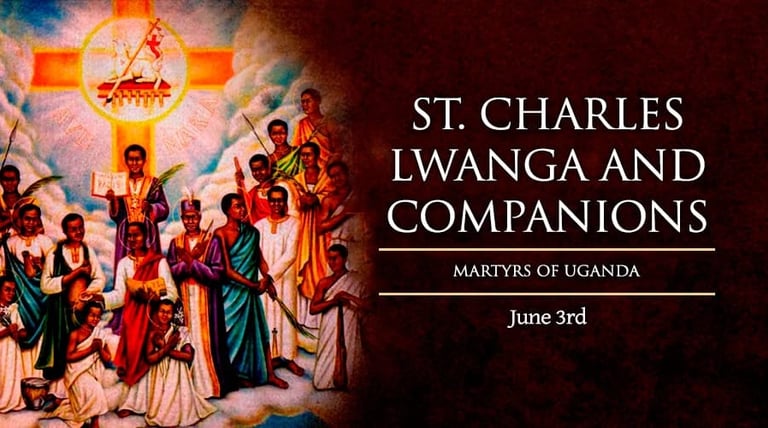Saint of the day June 3, 2025
St. Charles Lwanga and Companions
DAILY SAINT
Nirmala Josephine
6/3/20253 min read


St. Charles and many other martyrs for the faith died between November 15, 1885 – January 27, 1887 in Namugongo, Uganda. St. Charles and his companions were beatified in 1920 and canonized by Pope Paul VI in 1964.
In 1879 Catholicism began spreading in Uganda when the White Fathers, a congregation of priests founded by Cardinal Lavigerie were peacefully received by King Mutesa of Uganda.
The priests soon began preparing catechumens for baptism and before long a number of the young pages in the king’s court had become Catholics.
However, on the death of Mutesa, his son Mwanga, a corrupt man who ritually engaged in pedophilic practices with the younger pages, took the throne.
When King Mwanga had a visiting Anglican Bishop murdered, his chief page, Joseph Mukasa, a Catholic who went to great length to protect the younger boys from the king’s lust, denounced the king’s actions and was beheaded on November 15, 1885.
The 25 year old Charles Lwanga, a man wholly dedicated to the Christian instruction of the younger boys, became the chief page, and just as forcibly protected them from the kings advances.
On the night of the martyrdom of Joseph Mukasa, realizing that their own lives were in danger, Lwanga and some of the other pages went to the White Fathers to receive baptism. Another 100 catechumens were baptized in the week following Joseph Mukasa’s death.
The following May, King Mwanga learned that one of the boys was learning catechism. He was furious and ordered all the pages to be questioned to separate the Christians from the others. The Christians, 15 in all, between the ages of 13 and 25, stepped forward. The King asked them if they were willing to keep their faith. They answered in unison, “Until death!”
They were bound together and taken on a two day walk to Namugongo where they were to be burned at the stake. On the way, Matthias Kalemba, one of the eldest boys, exclaimed, “God will rescue me. But you will not see how he does it, because he will take my soul and leave you only my body.” They executioners cut him to pieces and left him to die alone on the road, which took at least three days.
When they reached the site where they were to be burned, they were kept tied together for seven days while the executioners prepared the wood for the fire.
On June 3, 1886, the Feast of the Ascension, Charles Lwanga was separated from the others and burned at the stake. The executioners slowly burnt his feet until only the charred remained. Still alive, they promised him that they would let him go if he renounced his faith. He refused saying, “You are burning me, but it is as if you are pouring water over my body.” He then continued to pray silently as they set him on fire. Just before the flames reached his heart, he looked up and said in a loud voice, “Katonda! – My God!,” and died.
His companions were all burned together the same day all the while praying and singing hymns until they died.
There were 24 protomartyrs in all. The last of the protomartyrs, a young man named John Mary, was beheaded by King Mwanga on January 27, 1887.
The persecutions spread during the reign of Mwanga, with 100 Christians, both Catholics and Protestants, being tortured and killed.
St. Charles Lwanga is the patron saint of African Catholic Youth Action.
Reflection
At the time of their martyrdoms, twenty-six-year-old Charles Lwanga and his young companions never could have imagined that one day, at the place of their execution, millions of people would gather every year to honor them and to seek their intercession. King Mwanga initially thought he could stamp out Christianity by killing one Christian. That only inspired others to convert. After Mwanga killed dozens more, the flames that burned them turned into flames of faith that inspired countless others. Uganda and many other African countries are Christian countries today, thanks in large part to the witness of faith given by these young men and boys. Romans 8:28 says, “We know that all things work for good for those who love God, who are called according to his purpose.“ In the case of the Ugandan Martyrs, their deaths worked for the good. Their burning flesh became a sweet odor that covered that pagan nation, drawing many to faith in Christ.
As we honor these heroic young martyrs, call to mind the truth that God can use every evil and suffering you endure for good when you unite them to the sufferings of Christ. Allow these martyrs, and the aftermath of their deaths, to inspire you and to convince you that all things do work for the good when we love God and embrace His holy will.
